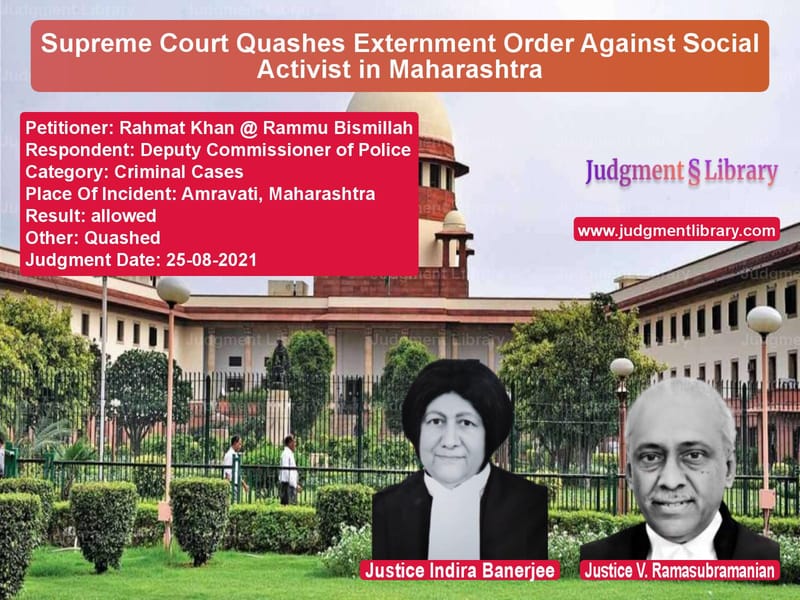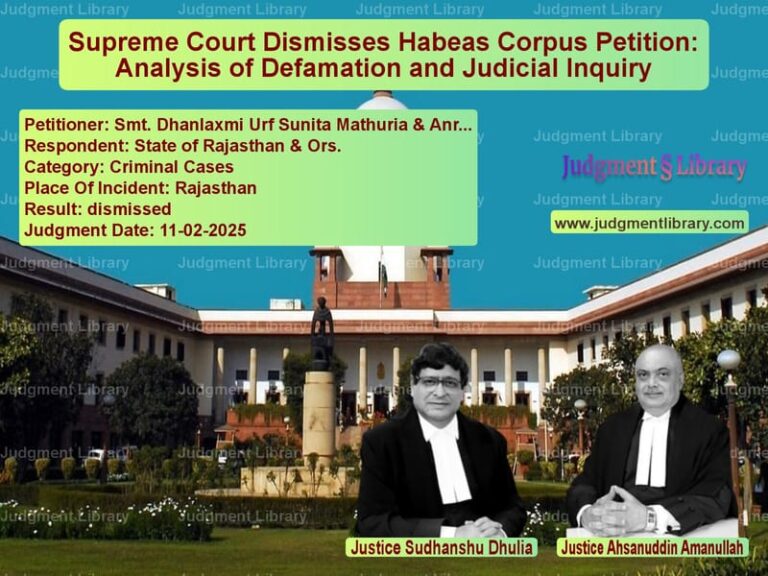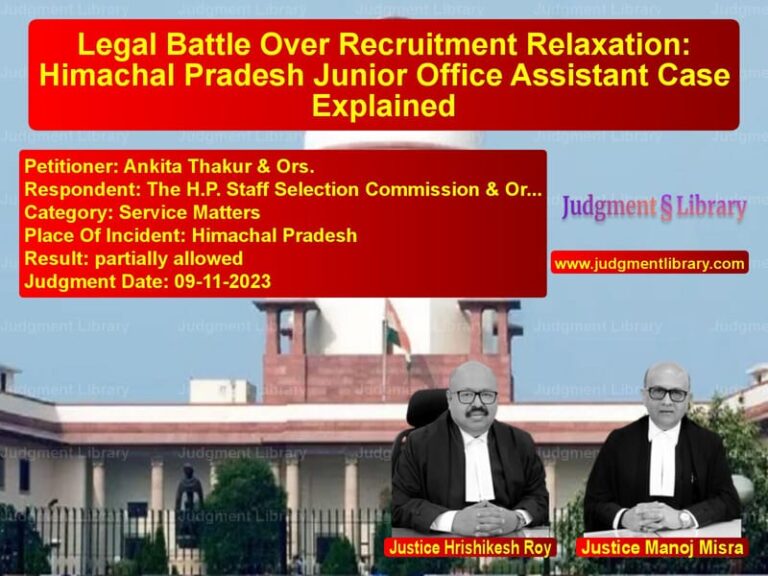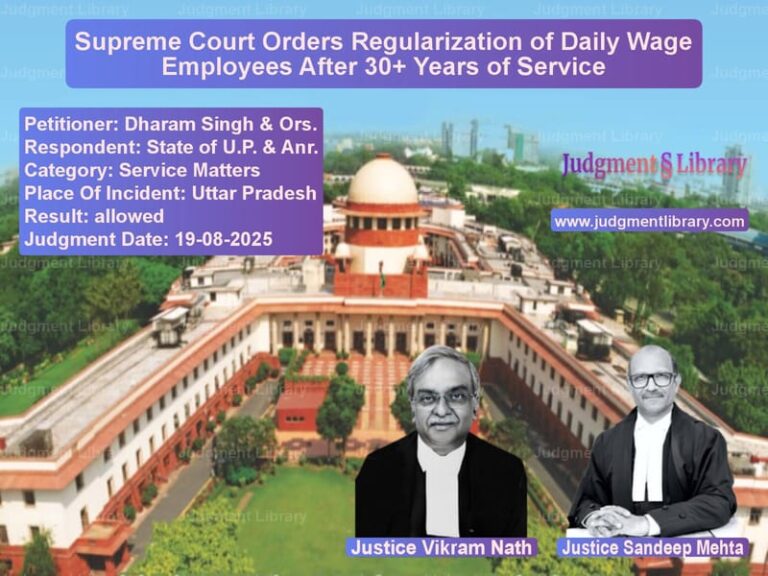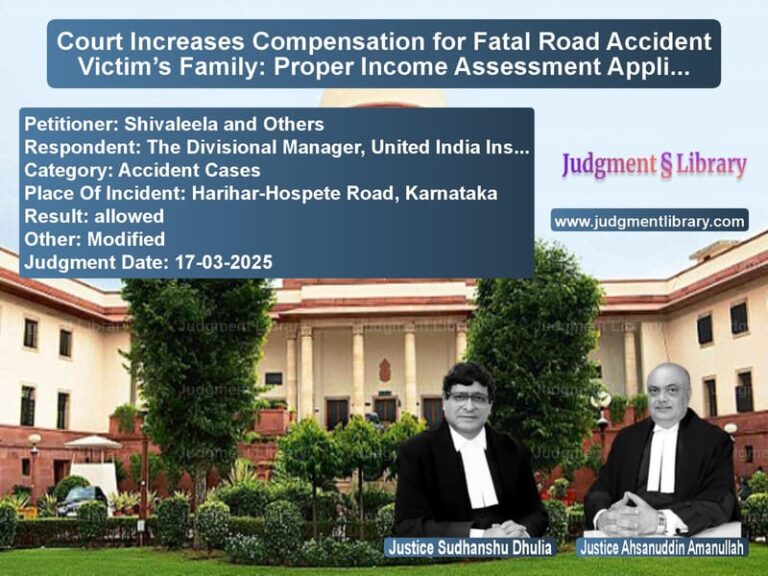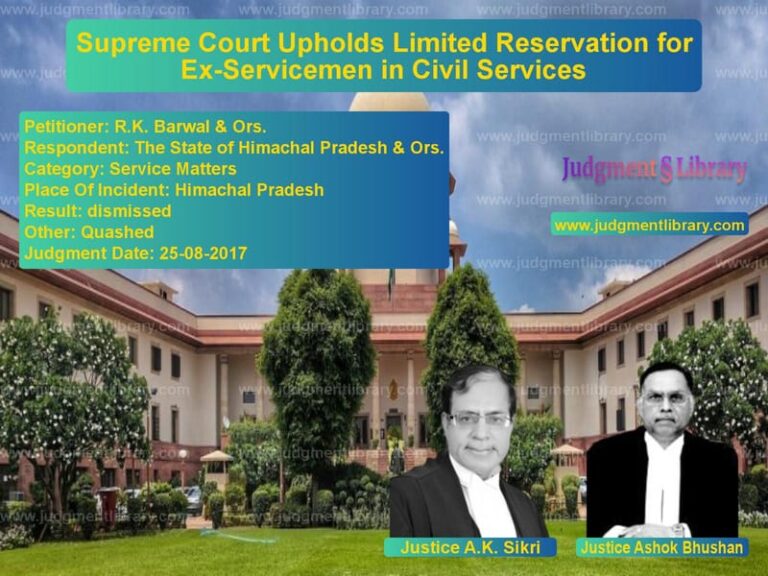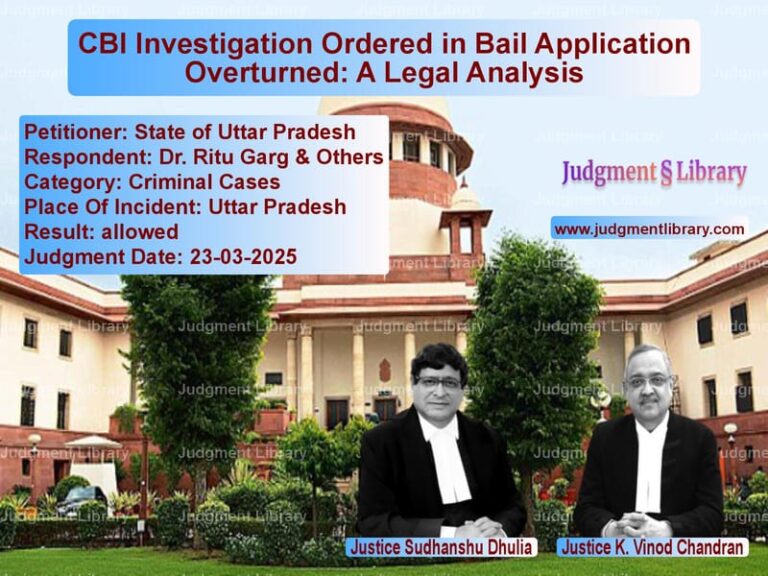Supreme Court Quashes Externment Order Against Social Activist in Maharashtra
The case of Rahmat Khan @ Rammu Bismillah vs. Deputy Commissioner of Police is a crucial ruling that examines the legality of externment orders issued under the Maharashtra Police Act, 1951. The Supreme Court’s decision sheds light on the protection of individual rights against arbitrary police actions and highlights the importance of ensuring due process before issuing such severe orders.
The appeal arose from a High Court decision upholding an externment order issued against the petitioner by the Deputy Commissioner of Police, Zone-1, Amravati City. The order directed that the petitioner should not enter or return to Amravati City or Amravati Rural District for a period of one year. The appellant challenged this decision, arguing that the externment order was arbitrary and based on malicious complaints.
Background of the Case
The externment order was issued under Section 56(1)(a)(b) of the Maharashtra Police Act, 1951. According to the order:
- The appellant had been accused of creating fear in the locality under Nagpuri Gate and Kotwali police stations since 2017.
- Several criminal cases were registered against him for offenses including threatening to kill, extortion, and criminal intimidation.
- The police argued that the appellant’s activities endangered public safety and warranted his externment from the district.
Petitioner’s Arguments
The petitioner, Rahmat Khan, contended that:
- The externment order was issued in retaliation for his activism against corruption in the disbursement of government grants to Madrasas.
- He had filed several complaints against government officials and educational institutions, exposing the misuse of public funds.
- The criminal cases against him were fabricated by those affected by his activism.
- The externment order violated his fundamental rights under Article 19 and Article 21 of the Indian Constitution.
Respondent’s Arguments
The Deputy Commissioner of Police argued that:
- The petitioner was a habitual offender whose presence in Amravati posed a threat to public safety.
- Multiple criminal cases had been registered against him, making his externment necessary under the Maharashtra Police Act.
- Several witnesses were unwilling to testify against him publicly out of fear.
- The externment order was justified in maintaining law and order.
Key Legal Considerations
The Supreme Court analyzed the provisions of Sections 56 to 59 of the Maharashtra Police Act and examined previous judgments on externment orders. The Court noted:
- An externment order is an extraordinary measure that severely restricts an individual’s fundamental rights.
- Authorities must provide clear and substantial evidence before issuing such an order.
- In Pandharinath Shridhar Rangnekar v. Dy. Commissioner of Police, the Supreme Court had emphasized that externment should only be used in exceptional cases.
- The police must prove that the accused’s actions pose an ongoing threat to public order.
Court’s Observations
The Supreme Court made several critical observations in its ruling:
“An externment order should not be used as a tool for silencing individuals who raise concerns against the government or public authorities.”
The Court found that:
- The complaints against the petitioner were filed after he raised allegations of corruption in the distribution of government grants.
- There was no substantial evidence to prove that he posed a genuine threat to public safety.
- The externment order was based on vague and unverified allegations.
- The authorities failed to justify why a lesser restriction would not have sufficed.
Final Verdict
The Supreme Court ruled in favor of the petitioner, quashing the externment order. The judgment stated:
“The externment order is arbitrary, mala fide, and unsustainable in law.”
The Court emphasized that law enforcement agencies must exercise restraint and ensure that externment powers are not misused. It reiterated that fundamental rights, including the right to movement and residence, cannot be curtailed without due process.
Implications of the Judgment
This ruling has significant implications for the use of externment orders in India:
- Protection of Activists: The judgment ensures that social activists and whistleblowers cannot be arbitrarily removed from their place of residence.
- Due Process in Externment Cases: The decision sets a precedent that authorities must provide clear and substantial evidence before issuing externment orders.
- Judicial Scrutiny: The ruling reinforces that courts will not tolerate misuse of externment powers against individuals exercising their legal rights.
The Supreme Court’s decision upholds the principles of justice and due process, ensuring that police powers are exercised within constitutional limits.
Petitioner Name: Rahmat Khan @ Rammu Bismillah.Respondent Name: Deputy Commissioner of Police.Judgment By: Justice Indira Banerjee, Justice V. Ramasubramanian.Place Of Incident: Amravati, Maharashtra.Judgment Date: 25-08-2021.
Don’t miss out on the full details! Download the complete judgment in PDF format below and gain valuable insights instantly!
Download Judgment: rahmat-khan-@-rammu-vs-deputy-commissioner-supreme-court-of-india-judgment-dated-25-08-2021.pdf
Directly Download Judgment: Directly download this Judgment
See all petitions in Bail and Anticipatory Bail
See all petitions in Custodial Deaths and Police Misconduct
See all petitions in Extortion and Blackmail
See all petitions in Attempt to Murder Cases
See all petitions in Fraud and Forgery
See all petitions in Judgment by Indira Banerjee
See all petitions in Judgment by V. Ramasubramanian
See all petitions in allowed
See all petitions in Quashed
See all petitions in supreme court of India judgments August 2021
See all petitions in 2021 judgments
See all posts in Criminal Cases Category
See all allowed petitions in Criminal Cases Category
See all Dismissed petitions in Criminal Cases Category
See all partially allowed petitions in Criminal Cases Category

